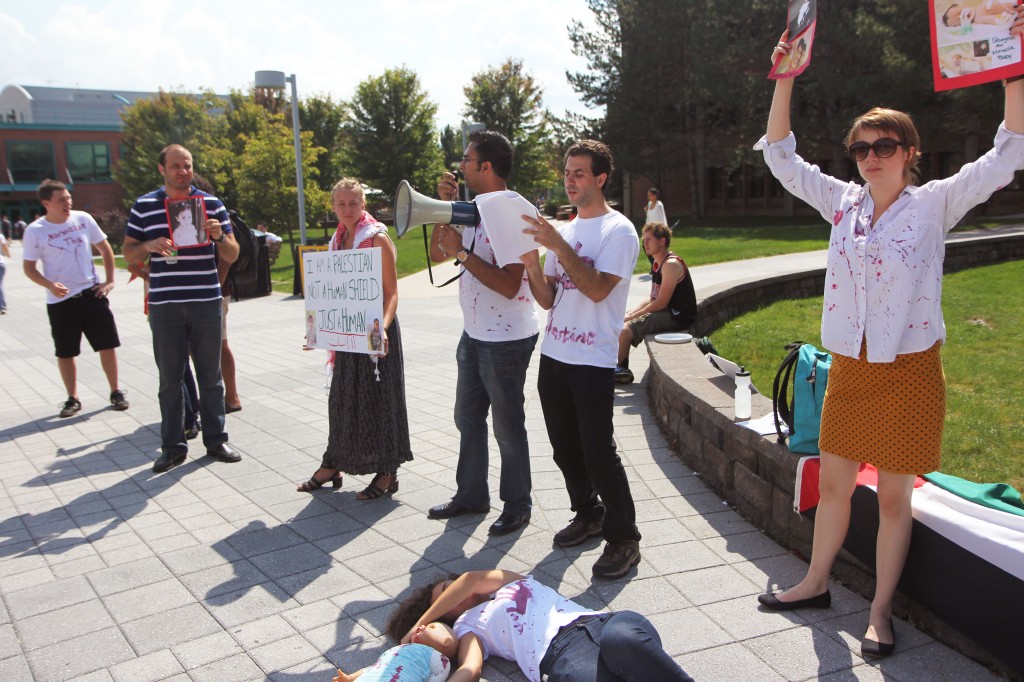
As Binghamton University’s newest batch of Bearcats made their way along the Spine to their first college classes on Tuesday morning, they came across a sight that has become common on BU’s campus in recent months: demonstrations from the Students for Justice in Palestine (SJP) and numerous Jewish student organizations.
Using a megaphone and wearing shirts splattered with fake blood, members of SJP read the names of children who were killed in the conflict in Gaza.
“We feel that we need to commemorate their lives, humanize their lives,” said Victoria Brown, a member of SJP and a fourth-year graduate student studying anthropology. “We’re not talking about the military, we’re not talking about the army, we’re talking about children — women and innocent civilians who were massacred.”
On the opposite side of the Spine, representatives from Hillel, Bearcats for Israel, Meor, J Street U, Binghamton University Zionist Organization (BUZO) and Chabad countered the demonstration by holding Israeli flags and encouraging passing students to “Have a great first day of classes.”
“With us it’s not really a demonstration, we’re just standing peacefully and educating the rest of the students to make sure that everything is put in context,” said Max Bartell, a member of Hillel and a junior majoring in philosophy, politics and law. “Putting things in context is the most important thing for us. If either side is going to stand here and espouse their information, the other side would need to put it into context.”
However, for some students, these demonstrations put a damper on their first day back. Mounir Karmoune, a senior majoring in accounting, said that he found the rallies “shocking.”
“It’s too overwhelming for the first day,” Karmoune said. “I’m trying to go to my first class and I have to walk through all this. It’s uncomfortable. I’m uncomfortable.”
Others took it even further. Aaron Feinberg, a junior majoring in finance, said that the demonstrations were “annoying” and “a nuisance.”
“This is a terrible impression for freshmen,” Feinberg said. “If this was my first day of school and I was walking through this, I wouldn’t like it at all. You want good vibes, you know?”
Some ralliers, however, said that the discomfort could end up having positive effects. Jonathan Lohnes, a member of SJP and a Ph.D. candidate in Middle Eastern history, said that whether or not a person felt overwhelmed by the demonstration was a matter of personal preference.
“I think a person who’s not otherwise inclined to do research on their own may see this and get interested,” Lohnes said. “I certainly hope that’s the case.”
Jorge Alpuente, a senior majoring in accounting, said that he thought the counter-demonstrations were great.
“As long as they’re allowed to be doing what they’re doing, I think people have the right to say what they feel,” Alpuente said. “It’s the best way to promote an idea, by getting a mass audience.”
He added that the only thing he would change was the fact that the opposing sides were facing each other.
“The one thing I would say is that I don’t like the way it’s going on, with one side facing the other,” Alpuente said. “I think it’s a bit threatening — when people are asking for peace — to have a standoff in the middle of campus.”
Carla Sinclair, Joseph Hawthorne and Alexandra Mackof contributed reporting to this story.


